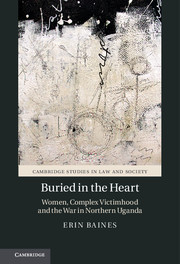6 - Conclusions
Published online by Cambridge University Press: 05 January 2017
Summary
To be human means to be responsible.
– Okot p'BitekQuoting Leslie Theile, Leebaw reminds us that precisely because “there are no rules to determine when, where and how new rules should be invented and old rules bent or broken” after mass violence, that “political judgment is a crucial dimension of praxis, the process of connecting theory to action.” To understand how human beings live with and work through violence, I have turned to life stories of complex victimhood. I have conceptualized politics as relational, recognizing the myriad ways persons constitute and reconstitute a sense of self in relation to others, and negotiate what it means to be a human being in settings of dehumanizing violence and exclusion. Resistance is not exclusively opposition to violence, but entangled in the realities of living through mass violence, while retaining a sense of humanity. This approach departs from traditional frameworks in transitional justice that seek to document violence against persons and hold accountable the most responsible persons, differentiating victims from perpetrators. To recognize victims as political beings is to redress the reduction of the victim to their victimhood. Recognizing victims as political agents allows us to work towards a more transformative consideration of what it means to live through violence, and together again after it.
Pursuing legal punishment or establishing historical records is necessary and desirable after mass violence. But without more, they provide us insufficient tools with which to fully comprehend the multiple ways justice is pursued and lived in post-war settings. In agreement with Leebaw, political judgment should be understood as praxis, not merely bound by rules of law, but open to debate, contestation and persuasion through telling a plurality of stories. These stories cannot be limited to singular, reiterative ones that reproduce binary distinctions of victims and perpetrators currently dominant in the field. Though human rights and humanitarian narratives of harm have roles and places in the making of judgment, they also limit the way politics is defined, fostered or enacted.
Stories of complex victimhood engage questions of agency, complicity and responsibility as lived experience. In this sense, justice is contextual; a consideration of the “ethical quandaries, qualms, and questions” ordinary persons encounter in extraordinary circumstances, towards a conceptualization of the ethical as “always an open question that is never identical to moral formulae and legal codes.”
- Type
- Chapter
- Information
- Buried in the HeartWomen, Complex Victimhood and the War in Northern Uganda, pp. 129 - 146Publisher: Cambridge University PressPrint publication year: 2016



